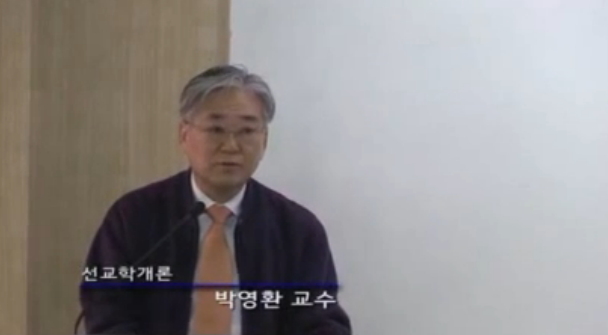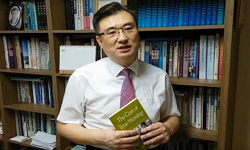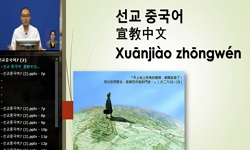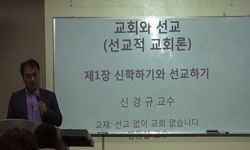Now, 135 years after the gospel was introduced to Korean society, the Korean church is assigned the task of this age to deviate from the Western church and fulfill the responsibilities of world missions. However, today’s Korean church is in the situ...
http://chineseinput.net/에서 pinyin(병음)방식으로 중국어를 변환할 수 있습니다.
변환된 중국어를 복사하여 사용하시면 됩니다.
- 中文 을 입력하시려면 zhongwen을 입력하시고 space를누르시면됩니다.
- 北京 을 입력하시려면 beijing을 입력하시고 space를 누르시면 됩니다.
부가정보
다국어 초록 (Multilingual Abstract)
The Korean Evangelical Missiological Society(KEMS) was founded in 1984 and developed by missionaries with the perception that it is a critical time to establish theology at the 100th anniversary of the Korean Church, and with the need to re-recognize ‘what the gospel is, and what mission is.’ In addition, it published the first issue of Evangelical Mission in 1985, and re-launched 13 years later in 1998 under the name of Theology of Mission, so that it is suggesting the correct missiological recognition and the direction for the future to Korean Missiological academia.
The first principle of evangelical church and Theology of Mission is to start from the biblical perspective. This is to know the importance of the establishment of Biblical Theology of Mission by perceiving that life cannot be expected in mission without the church, just as there is no life in the church without mission. The second principle is the insight to read today’s world through the Bible. We need to generally observe ‘what missions and the role of church are’ in the 4th industrial Revolution period, and to examine churches and mission fields based on Bible. The third principle is that missionaries should study the gospel for own whole life.
From now on, KEMS must be able to carry out the Great Commission(to proclaim the gospel to the ends of the earth) of Jesus Christ through union and cooperation between religious bodies and theological colleges in order to look ahead the future of the Korean Church, to not fail missional policies, and also to fulfill future missions. In other words, while the church needs to strengthen its support for more missional capabilities and innovation in the study of missionary theologians, missionary theologians need to come up with various tasks to apply the results of research to the church’s growth and mission fields.
Now, 135 years after the gospel was introduced to Korean society, the Korean church is assigned the task of this age to deviate from the Western church and fulfill the responsibilities of world missions. However, today’s Korean church is in the situation of serious criticism to the church called new Christian persecution, and also is facing with situation to have to prepare for a variety of international issues, including the new Cold war and the dynamic structure, the strategic policies of nationalism(native priority principle), the global recession, and issues of immigrants and refugees.
The Korean Evangelical Missiological Society(KEMS) was founded in 1984 and developed by missionaries with the perception that it is a critical time to establish theology at the 100th anniversary of the Korean Church, and with the need to re-recognize ‘what the gospel is, and what mission is.’ In addition, it published the first issue of Evangelical Mission in 1985, and re-launched 13 years later in 1998 under the name of Theology of Mission, so that it is suggesting the correct missiological recognition and the direction for the future to Korean Missiological academia.
The first principle of evangelical church and Theology of Mission is to start from the biblical perspective. This is to know the importance of the establishment of Biblical Theology of Mission by perceiving that life cannot be expected in mission without the church, just as there is no life in the church without mission. The second principle is the insight to read today’s world through the Bible. We need to generally observe ‘what missions and the role of church are’ in the 4th industrial Revolution period, and to examine churches and mission fields based on Bible. The third principle is that missionaries should study the gospel for own whole life.
From now on, KEMS must be able to carry out the Great Commission(to proclaim the gospel to the ends of the earth) of Jesus Christ through union and cooperation between religious bodies and theological colleges in order to look ahead the future of the Korean Church, to not fail missional policies, and also to fulfill future missions. In other words, while the church needs to strengthen its support for more missional capabilities and innovation in the study of missionary theologians, missionary theologians need to come up with various tasks to apply the results of research to the church’s growth and mission fields.
국문 초록 (Abstract)
한국복음주의선교신학회는 1984년 한국 교회 100주년을 맞는 시점에 이르러 ‘신학을 정립해야 할 결정적인 시점’이라는 인식과 함께 ‘복음이 무엇이며 또 선교가 무엇인가’를 재인식해야 할 필요성을 느낀 선교학자들에 의해 설립되고 발전하여 지금에 이르고 있다. 또한 1985년 「복음선교」 창간호가 발행되었고, 13년 후인 1998년 「선교신학」 이란 명칭으로 재창간되면서 올바른 선교 신학적 인식과 함께 한국 선교신학계가 나아가야 할 방향을 제시하고 있다.
복음주의 교회와 선교신학의 첫째 원리는 성경적 관점에서 출발하는 것이다. 그리고 선교 없는 교회에 생명이 없는 것과 마찬가지로, 교회 없는 선교에서는 생명력을 기대할 수 없다는 것을 인식하고 성경적 선교신학의 확립이 중요함을 아는 것이다. 두 번째 원리는 성경을 통해 오늘의 세계를 읽는 통찰력이다. 우리에게는 4차 산업혁명 시대의 선교사역과 교회의 역할은 무엇인가를 통섭적(統攝的)으로 관찰하는 일과 성경을 척도(尺度)로 하여 교회와 선교현장을 진단하는 기술이 필요하다. 셋째 원리는 사역자는 평생 복음을 위해 복음에 대한 공부를 해야야 한다는 것이다.
한국교회의 미래를 내다보고 선교정책이 실패하지 않도록 지금부터 우리 학회는 미래 선교를 위한 대비정책과 수립을 위하여 교단과 각 신학대학이 연합과 협력을 통한 예수 그리스도의 지상명령(땅 끝까지 복음 선포)을 수행할 수 있어야 한다. 교회는 선교학자들의 연구를 위하여 보다 더 많은 선교역량 강화와 혁신을 위한 지원을 강화하고, 선교학자들은 연구 결과물이 교회성장과 선교현장에 적용될 수 있도록 다양한 과제들을 내놓아야 한다.
한국 사회에 복음이 전파된 지 135년이 지난 지금, 서구 교회에서 벗어나 세계선교의 책임을 다해야 하는 시대적 과제를 안게 되었다. 그러나 지금 한국 교회는 신 기독교박해라 불리는 교회...
한국 사회에 복음이 전파된 지 135년이 지난 지금, 서구 교회에서 벗어나 세계선교의 책임을 다해야 하는 시대적 과제를 안게 되었다. 그러나 지금 한국 교회는 신 기독교박해라 불리는 교회에 대한 비판이 심해지는 상황 가운데 신 냉전과 역학구도, 자국우선주의 전략 정책, 글로벌 경기침체, 이주민과 난민 문제 등 다양한 국제적 문제에 대비해야 하는 상황에 직면해 있다.
한국복음주의선교신학회는 1984년 한국 교회 100주년을 맞는 시점에 이르러 ‘신학을 정립해야 할 결정적인 시점’이라는 인식과 함께 ‘복음이 무엇이며 또 선교가 무엇인가’를 재인식해야 할 필요성을 느낀 선교학자들에 의해 설립되고 발전하여 지금에 이르고 있다. 또한 1985년 「복음선교」 창간호가 발행되었고, 13년 후인 1998년 「선교신학」 이란 명칭으로 재창간되면서 올바른 선교 신학적 인식과 함께 한국 선교신학계가 나아가야 할 방향을 제시하고 있다.
복음주의 교회와 선교신학의 첫째 원리는 성경적 관점에서 출발하는 것이다. 그리고 선교 없는 교회에 생명이 없는 것과 마찬가지로, 교회 없는 선교에서는 생명력을 기대할 수 없다는 것을 인식하고 성경적 선교신학의 확립이 중요함을 아는 것이다. 두 번째 원리는 성경을 통해 오늘의 세계를 읽는 통찰력이다. 우리에게는 4차 산업혁명 시대의 선교사역과 교회의 역할은 무엇인가를 통섭적(統攝的)으로 관찰하는 일과 성경을 척도(尺度)로 하여 교회와 선교현장을 진단하는 기술이 필요하다. 셋째 원리는 사역자는 평생 복음을 위해 복음에 대한 공부를 해야야 한다는 것이다.
한국교회의 미래를 내다보고 선교정책이 실패하지 않도록 지금부터 우리 학회는 미래 선교를 위한 대비정책과 수립을 위하여 교단과 각 신학대학이 연합과 협력을 통한 예수 그리스도의 지상명령(땅 끝까지 복음 선포)을 수행할 수 있어야 한다. 교회는 선교학자들의 연구를 위하여 보다 더 많은 선교역량 강화와 혁신을 위한 지원을 강화하고, 선교학자들은 연구 결과물이 교회성장과 선교현장에 적용될 수 있도록 다양한 과제들을 내놓아야 한다.
참고문헌 (Reference)
1 김채연, "한국은 중요한 롤모델…"
2 전호진, "한국복음주의선교학회에 대한 역사 질문에 대한 응답"
3 전호진, "편집에 즈음하여" 한국복음주의 선교신학회 1 : 3-4, 1985
4 채인택, "채인택의 글로벌 줌업"
5 이유경, "정부군 용병 대 지하디 용병"
6 "전호진 교수와의 통화 인터뷰-2018년 11월 15일 오전 7시 30분 경"
7 조영태, "인구로 보는 세계"
8 이창호, "인간과 AI간 협업 프로세스 짜야"
9 장훈태, "아프리카 빈곤과 난민" 13-33, 2018
10 이슬아, "아라비아의 무산담 반도"
1 김채연, "한국은 중요한 롤모델…"
2 전호진, "한국복음주의선교학회에 대한 역사 질문에 대한 응답"
3 전호진, "편집에 즈음하여" 한국복음주의 선교신학회 1 : 3-4, 1985
4 채인택, "채인택의 글로벌 줌업"
5 이유경, "정부군 용병 대 지하디 용병"
6 "전호진 교수와의 통화 인터뷰-2018년 11월 15일 오전 7시 30분 경"
7 조영태, "인구로 보는 세계"
8 이창호, "인간과 AI간 협업 프로세스 짜야"
9 장훈태, "아프리카 빈곤과 난민" 13-33, 2018
10 이슬아, "아라비아의 무산담 반도"
11 전호진, "성경에서 본 선교원리와 전략" 1 : 87-101, 1985
12 전호진, "선교신학 발간사" 2 : 4-5, 1998
13 장훈태, "서부아프리카 코트디부아르공화국 야오부 마을의 전통적 샤머니즘 문화 상황에서의 선교전략" 한국복음주의선교신학회 35 (35): 229-274, 2016
14 Welch, Craig, "붕괴되는 남극의 해빙"
15 장훈태, "부르키나파소공화국 티에포족의 전통 노래에 나타난 신과의 소통·문화 정체성 고찰을 통한 선교" 한국복음주의선교신학회 41 (41): 183-232, 2018
16 곽선희, "복음 선교 서문" 한국복음주의 선교신학회 1 : 5-6, 1985
17 김광성, "로잔운동이 제시한 총체적선교 관점에서 바라본 대한민국 교회의 난민사역 고찰" 한국복음주의선교신학회 35 (35): 13-46, 2016
18 전호진, "기독교 박해 시대 -한국선교의 방향-" 선교햇불 2018
19 곽선희, "교회성장과 선교" 1 : 33-47, 1985
20 한국복음주의선교신학회, "「선교신학」 제2권" 1998
21 "http://news.kmib.co.kr/article/view.asp?arcid=0011117937&code=61221111&cp=nv"
22 이현주, "4차 산업혁명 시대 새로운 선교전략의 필요성" 한국복음주의선교신학회 41 (41): 113-152, 2018
23 소윤정, "2018년 11월 15일 오후 2시 21분에 소윤정교수와의 이메일 인터뷰 확인"
24 김순신, "162년 전통 버버리식의 변신, 2018년 11월 14일(수)"
동일학술지(권/호) 다른 논문
-
한국 최초 방문 선교사 칼 귀츨라프(Karl F. Gutzlaff)의 선교 사상과 조선 선교 연구
- 한국복음주의선교신학회
- 조해룡 ( Cho Hea Lyong )
- 2019
- KCI등재
-
중앙아시아 지역학을 통한 선교로의 접근 : 몽골 문화의 유산과 러시아와의 역사적 관계를 중심으로
- 한국복음주의선교신학회
- 정세진
- 2019
- KCI등재
-
- 한국복음주의선교신학회
- 안승오
- 2019
- KCI등재
-
케네스 크래그(Kenneth Cragg)의 이슬람 연구에 관한 소고
- 한국복음주의선교신학회
- 정승현
- 2019
- KCI등재
분석정보
인용정보 인용지수 설명보기
학술지 이력
| 연월일 | 이력구분 | 이력상세 | 등재구분 |
|---|---|---|---|
| 2026 | 평가예정 | 재인증평가 신청대상 (재인증) | |
| 2020-01-01 | 평가 | 등재학술지 유지 (재인증) |  |
| 2017-01-01 | 평가 | 등재학술지 유지 (계속평가) |  |
| 2013-01-01 | 평가 | 등재학술지 선정 (등재유지) |  |
| 2012-01-01 | 평가 | 등재후보 1차 PASS (등재후보1차) |  |
| 2011-01-01 | 평가 | 등재후보학술지 유지 (등재후보1차) |  |
| 2009-01-01 | 평가 | 등재후보학술지 선정 (신규평가) |  |
학술지 인용정보
| 기준연도 | WOS-KCI 통합IF(2년) | KCIF(2년) | KCIF(3년) |
|---|---|---|---|
| 2016 | 0.8 | 0.8 | 0.81 |
| KCIF(4년) | KCIF(5년) | 중심성지수(3년) | 즉시성지수 |
| 0.77 | 0.71 | 0.448 | 0.68 |




 KCI
KCI KISS
KISS






